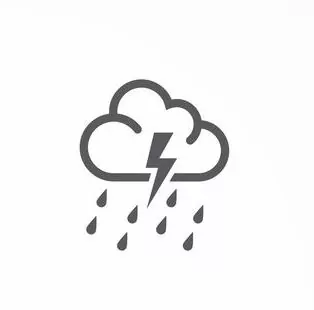
Notice Your Head Spinning When Severe Storms Like Tornados or Hurricanes Spin Your Way?
How To Get Help.
Severe spring storms, violent tornados and hurricane season are especially difficult for millions suffering from “seasonal vertigo” as weather changes can bring on debilitating migraines and sufferers report having the ability to predict these weather and barometric changes before storms hit.
“Migraine sufferers are sensitive people,” says Dr. Timothy Hain, an otoneurologist specializing in inner ear balance disorders. “Studies have shown that they have lower thresholds to a large array of sensory inputs, with light, sound, smell, facial pain, and motion being the most common ones. It is likely that they are also more sensitive to barometric pressure, which is why they have more trouble when the weather changes rapidly.”
Referencing a study by W.F. Stuart and R. B. Lipton, Dr. Hain explains that migraine is a very common disorder, found in about 14% of the population. “Vestibular migraine (i.e. migraine with associated dizziness or imbalance) has been shown to occur in about 1% of the population or 1/100 people,” reports Dr. Hain.
No one knows more about the excruciating effects of changes in barometric pressure than Gina Johnson, who lives in Georgia, where strong spring storms and even tornados are common this time of year. Gina suffers from migraine associated vertigo, a type of “sick headache” typically characterized by unilateral onset of head pain with severe progressive intensity. She says that when a storm is coming in, she can feel it.
“The pain starts in the top of my head or sometimes in my face,” says Gina. “It gets worse as the hours go by, and normally leaves me so incapacitated that all I can do is lie down and wait for it to go away.”
Gina reports other symptoms that accompany her migraine include sensitivity to sound and light, nausea, and feeling off-balance, like she’s on a boat that is rocking.
“The episodes last about 24 hours, like clockwork. Even medication, like Advil or feverfew – an herbal remedy – don’t completely resolve the symptoms, although they do take the edge off,” says Gina.
The Vestibular Disorders Association (VeDA) is a nonprofit organization that advocates for people with vestibular (inner ear balance) disorders.
“Many vestibular patients experience troubling symptoms during the spring and fall due to shifts in weather patterns,” reports Cynthia Ryan, VeDA’s executive director. “It’s easy to chock this up to allergies or other causes, so many people don’t investigate the reason for their dizziness or migraines, and consequently their condition remains undiagnosed.”
Help for Seasonal Vertigo
Gina offers these words of wisdom to other migraine sufferers: “When you feel it coming on, don’t fight it – the anxiety will only make it worse. The best thing to do is to prepare by resting and not planning any big activities. You can also reduce the frequency and intensity of migraine attacks by avoiding foods like caffeine and MSG, which can be migraine triggers.”
If weather changes impact your health, causing dizziness, migraines, or other unexplained symptoms, see your doctor. Don’t assume the cause is something simple, or that it’s nothing because the symptoms dissipate or go away after a few weeks.
Become an informed advocate for your own healthcare. Read up on possible causes of dizziness at vestibular.org so that you can make the most of the precious little time you have with your primary care physician. The more you know, the better you’ll understand their explanation for your dizziness, migraine, or other symptoms.
According to the National Institutes of Health (NIH), 40% of the US population over 40 years will experience a balance disorder in their lifetime. Dizziness is the 3rd most common major medical symptom reported, yet the majority of cases remain unexplained. Overall, vertigo from a vestibular problem accounts for a third of all dizziness and vertigo symptoms reported to health care professionals.
 Many vestibular patients are sensitive to bright lights. The sun’s warm rays cause anguish. Fluorescent lights at work make it hard to focus. The glare from your computer screen is more than just annoying.
Many vestibular patients are sensitive to bright lights. The sun’s warm rays cause anguish. Fluorescent lights at work make it hard to focus. The glare from your computer screen is more than just annoying.